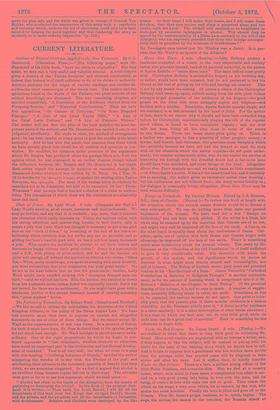CURRENT LITERATURE.
Outlines of Textual Criticism Applied to the New Testament. By C. C. Hammond. (Clarendon Press.)—" The following pages," says Mr. Hammond of his little book, "have no claim to originality." But they make, we may say, a very useful and valuable manual. A brief chapter gives a history of the ' Textus Receptus,' and disposes conclusively, as indeed that history is of itself sufficient to do, of its claims to authority. Another accounts for the origin of various readings, and another de- scribes the chief manuscripts of the Greek text. The version and the quotations found in the works of the Fathers, two great sources of our critical knowledge, are discussed. The two remaining chapters are entitled respectively, "A Discussion of the Evidence derived from the Foregoing Sources," and "Historical Corroboration." Then we have five appendices, "On Canons of Criticism," "On Some Disputed Passages," "A List of the Chief Uncial MSS.," "A List of the Chief Latin Codices," and "A List of Patristic Writers." The reader will see that the plan of the book includes the most im- portant parts of the subject, and Mr. Hammond has carried it out, in our judgment, excellently. His style is clear, his method of arrangement good ; he has been careful on every point to give the results of the latest authority. And he has also the merit, less common than those which we have already given him credit for, of candour and openness to con- viction. He modifies, for instance, under pressure of the arguments which Mr. Burgon has produced about the passage Mark xvi., 9-20, the opinion which he had expressed in an earlier chapter, though indeed the difference between Mr. Burgon and Mr. Hammond is but slight. Both critics regard the passage in question as canonical, though Mr. Hammond doubts whether it was written by St. Mark. On 1 Tim.
16 he decides for 'ot itpawpan b eapzi, as against the reading of the Textus Receptus, 014 irpotylpa'A. The story of the woman taken in adultery he considers not to be Johannine, but still to be canonical. Of the " Three- Witnesses " text he says that it has not a shadow of a claim to authen- ticity. The discussions of which these are the conclusions are admirably terse and lucid.


































 Previous page
Previous page